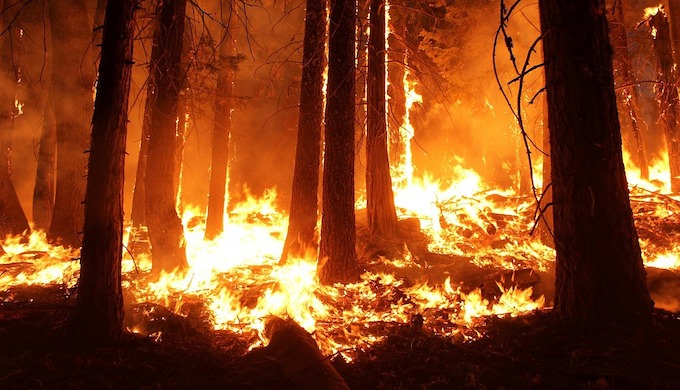The only way to restrain climate change is an upsurge in peoples’ movements for environment, peace, justice and equality, journalist Bharat Dogra underlines in his new book

Recent wildfires around the world have been blamed partly on rising temperatures caused by climate change (Photo by S. Keeze)
With over four decades of journalism in the fields of environment and sustainable development, Bharat Dogra knows common sense is really uncommon. For that reason alone, he has put together all the common-sense arguments to save the world and us in his new book — Planet in Peril.
The full title — Survival Crisis, Planet in Peril, People’s Response Only Way Forward — says in a nutshell what Dogra’s book is about. Unsurprisingly, he lays primary emphasis on the dangers to humanity posed by climate change. But he does much more. He connects the dots between climate change, nuclear weapons, food poisoning by pesticides, genetically modified food, and biodiversity loss.
It adds up to an apocalyptic vision of human greed hurtling all of us towards annihilation. Dogra is clear that only civil society movements around the world can stop this by coming together and successfully fighting today’s predominant global economic paradigm. It may sound naïve, but no one has come up with a better solution.

Wealth of material
Dogra provides a wealth of material to make his case. He refers to scientific studies that suggest that three planetary boundaries may already have been transgressed — climate change, biological diversity and nitrogen input to the biosphere. These are strongly connected boundaries, and transgressing one imperils all others.
The net result is that the environment that humans have used for the past 11,000 plus years — in which our agriculture and our civilisations have grown — is in danger of changing irrevocably. And no scientist can really model the impact beyond saying it is going to be catastrophic for all of us.
Despite repeated warnings from scientists, business-as-usual rolls blithely on, and Dogra points out that emissions of greenhouse gases that are warming the atmosphere and leading to climate change rose in 2017 (they rose again in 2018).
Talking about our part of the world, he refers to a study by Muthukumara Mani of the World Bank. “Today, almost half of India’s population lives in areas that are projected to become moderate to severe hotspots by 2050, where the impact of climate change is likely to be the greatest. Although coastal areas receive much of the attention, we find that many of these climate hotspots turn out to be in inland areas in central and north India.”
Dogra adds, “Seven of the most affected districts are in Vidharbha region of Maharashtra state while three others are in Madhya Pradesh and Chhattisgarh. Other badly affected areas are in Rajasthan and Uttar Pradesh.”
Freshwater cycle
In the crucial area of water, a study Dogra refers to is by Johann Rockstrom of the Stockholm Resilience Centre. The study says, “The global freshwater cycle has entered the Anthropocene because humans are now the dominant driving force altering global-scale river flow and the spatial patterns and seasonal timings of vapour flows. An estimated 25% of the world’s river basins run dry before reaching the oceans due to use of freshwater resources in the basins. Global manipulations of the freshwater cycle affect biodiversity, food, and health security and ecological functioning, such as provisions of habitat for fish recruitment, carbon sequestration, and climate regulation, undermining the resilience of terrestrial and aquatic ecosystems.”
The book traces the stumbling progress of global climate negotiations. Dogra lays the blame for this and most other ills to “rampant consumerism and a widely pervasive culture of greed and instant gratification.”
To the author, the solution lies in “a great upsurge among people of the world and a huge increase in their acceptance of this great responsibility” to develop human society in a sustainable manner. “The coming together of peace, environment, justice, equality and gender movements to achieve this great task” is the only way, he says, emphasising the need to link local and global issues. Dogra goes to the extent of advocating for a world government.
In a way that not many authors do, Dogra links greenhouse gas emissions and nuclear, chemical and other weapons, saying that apart from everything else, the manufacture of such weapons also leads to a lot of emissions. So does the manufacture of chemical fertilisers, pesticides, insecticides and herbicides, he points out.
Solutions
Solutions exist, as Dogra knows from his decades of writing on such issues. He places great stress on organic farming and use of local seed varieties and he is confident that this can feed a world of over nine billion humans.
The roadmap to veer away from destruction to sustainability is through peoples’ movements, says the author, and for this a first step would be to raise awareness of the dangers that we have placed ourselves in.
He says it will be easiest to raise this awareness if the solutions suggested resolve the day-to-day economic and social problems of people. He is confident that through this route, people around the world can and will get together and change the prevailing development paradigm. It remains to be seen if Dogra is utopian or prophetic.
